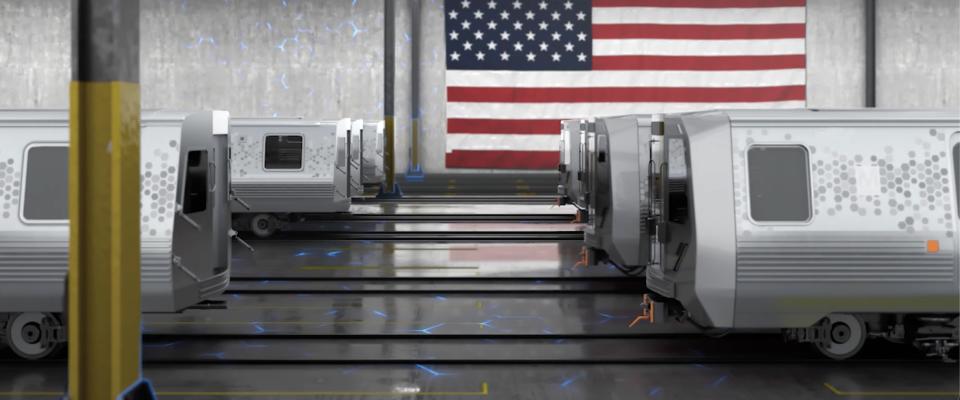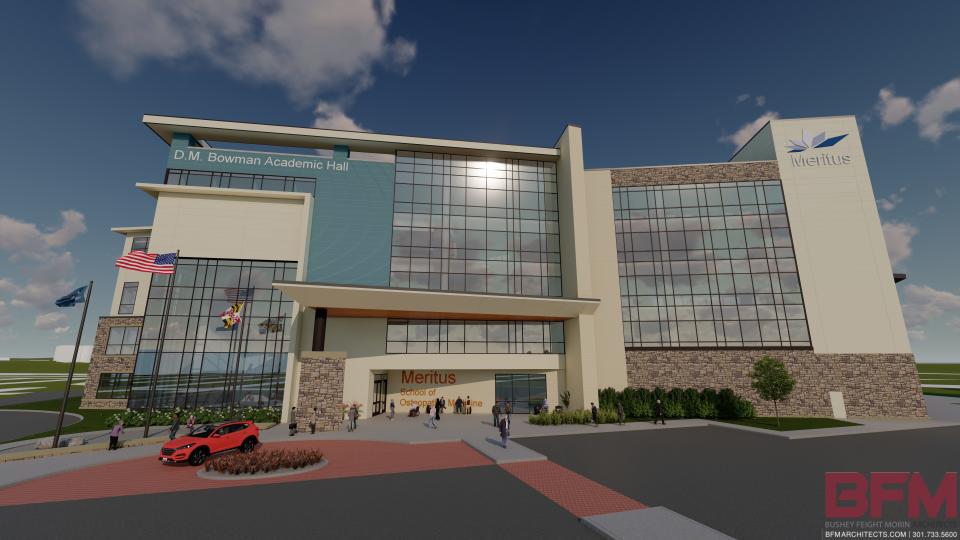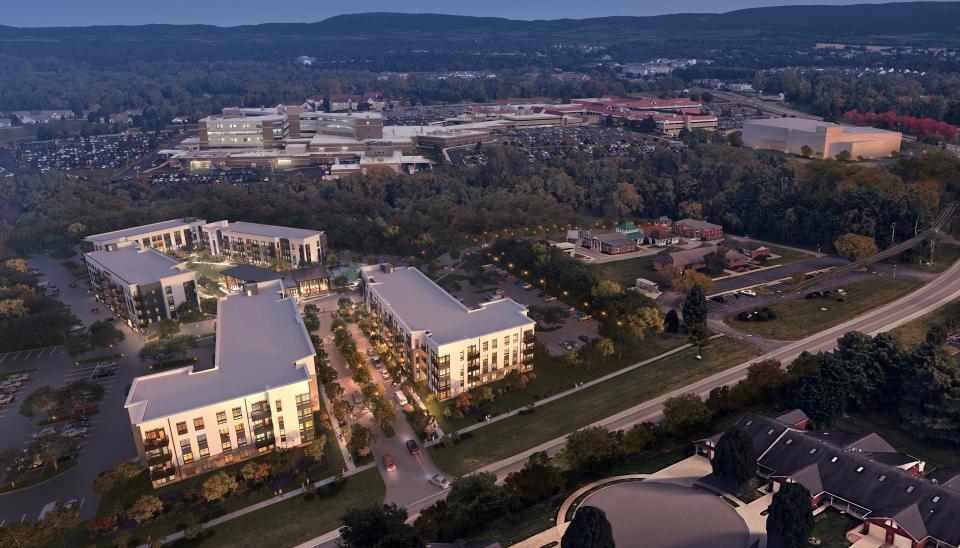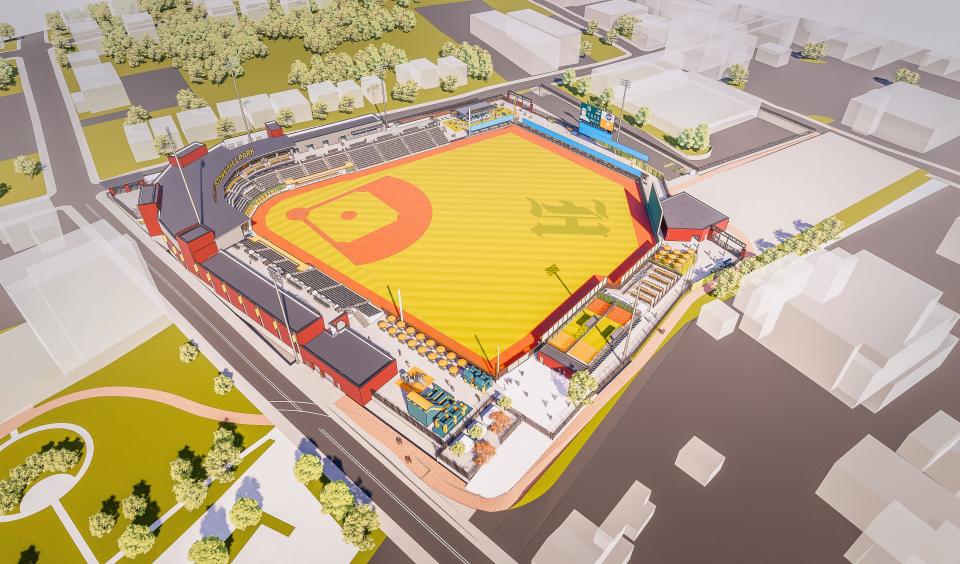Hagerstown's new factory, med school and stadium: Why are these projects 'game-changers'?
- Oops!Something went wrong.Please try again later.
Editor's note: This is the third in a series of stories looking at the growth and development in Washington County over the past few years, answering the question "Why now?"
The date was Oct. 18, 2022, and then-Gov. Larry Hogan and U.S. Rep. David Trone, D-6th, traveled to Hagerstown to herald three projects with the potential to revolutionize Washington County's economic future.
Speaking at the groundbreaking for the planned Meritus Osteopathic School of Medicine, Hogan called the project "transformative," noting "this institution will educate and prepare the next generation of physicians to serve patients not just here, but all across the state of Maryland — but especially the people right here in this community."
Speaking earlier in the day at the site of the coming Hitachi Rail factory in Halfway, the governor discussed the impact of that project, saying "the job creation potential and associated economic benefits are an absolute game-changer for this region and for the entire state."
Later, he addressed the groundbreaking ceremony for the new multi-use stadium in downtown Hagerstown. He called the stadium "Hagerstown's very own 'field of dreams'" that would bring professional baseball back to the city and serve as "another engine of economic activity and tourism for the area." It was, he said, a "once in a generation project."
Of all the new development happening in Washington County, these three projects have the potential for the most impact on the local economy — and the local population.
Hitachi is on schedule to open the factory early next year, and when it becomes fully operational, Hitachi will directly provide the full-time equivalent of up to 460 new jobs, and estimates it will indirectly sustain hundreds more for support and service businesses.
The medical school, slated to open for classes in autumn 2025, will employ about 80 staff. Its first class is estimated to be 90 students. The full complement of students is eventually expected to reach 180 in each class, according to documents provided by Meritus.
Business and policy leaders here echo the former governor's descriptions of these three projects — "transformative." "Game-changing." "Economic engine."
Hitachi "could be another legacy up here, just like Mack Truck, just like Fairchild was," said Jim Kercheval, executive director of the Greater Hagerstown Committee.
With the advent of the medical school, pathways are being developed between Washington County Public Schools, Hagerstown Community College and the University of Maryland System at Hagerstown to give local students opportunities to prepare for med school.
"Somebody could go to school here from kindergarten and end up a doctor," Kercheval noted.
These projects, noted Robin Ferree, president of Bowman Development Inc., have ramifications well beyond Washington County.
"This whole region — Franklin (County, Pa.), Washington, Berkeley County (W.Va.) — the whole region is growing. And Hagerstown and Washington County's benefiting from the growth in Franklin and Berkeley counties as well."
The growth in industry, particularly, "creates a demand for labor," he said.

Hitachi says it's here for the long haul
"We're excited to see a global name like Hitachi come to our area," Kercheval told The Herald-Mail. The new Hitachi Rail factory "is the first of its kind in the United States, and I think that says a lot about our workforce here, about our community that they chose us over a lot of strong competition."
And there was plenty of competition for the Hitachi factory, even from within Maryland itself.
"It really came down to Washington County and Prince George's County," said Sen. Paul Corderman, R-Washington.
"We sent multiple letters of support on behalf of that project," he said, working with Andrew Sargent, senior business development representative for Western Maryland with the state Department of Commerce.
"We've seen, unfortunately, some of our surrounding areas that have lost some manufacturing opportunities," he said, "and to be able to come in and win an opportunity, especially not only an opportunity to add manufacturers in our area, but an opportunity where they were looking at another area in a part of the state where those things are a dime a dozen — in Prince George's County, Montgomery County, the (Interstate) 95 corridor."
Prince George's, he said, "was still trying to the very last to kind of flip that back towards their way.
"I'm sure they're excited and happy when they get those opportunities, but the impact that it's going to make in our community is night and day to the impact that it makes on some of those other communities."
"Hitachi Rail did a thousand-community search across the entire United States on where to put their manufacturing facility," said Washington County Director of Business Development Jonathan Horowitz. "It could go anywhere; it doesn't matter to them, it's just the best cost of doing business for them.
"It came down to two communities. And that would be Prince George's County, Md., and Washington County, Md. Well, it makes a whole lot more sense for them to be in Prince George's County, Md. That's where the metro system is. The reason that Washington County was chosen was because this is a better place for them to do business."
After analysis of "hundreds of points of reference," he said, "Washington County was better even than to be in the backyard of where their product is going to roll off the line."
Hitachi plans for the factory to be its permanent production site in North America, Giampaolo Nuonno, senior director, Vehicles Business, Hitachi Rail in North America told The Herald-Mail earlier this year.
"In our vision, in our plans, it will be devoted to serve all (the) array of products that we'll have in North America," he said.
The factory will outfit 256 rail cars for the Washington Metropolitan Area Transit Authority, with options for up to 800. Beyond that, Nuonno said the company already had plans to produce cars for the Metro system in Baltimore and for the Ontario line in Canada.
"The intention is that the factory is designed to be equipped in order to serve multiple types of products," he said, "so it's not going to be concentrated only on Metro, but it can also serve additional types of products like commuter trains or lightweight vehicles. So it will be very flexible and will allow us to serve the market in accordance with the demand."
Hitachi already has hired for some of its positions here, including procurement, project management and industrial engineering.
Local business leaders expect Hitachi's presence here will raise the county's business reputation.
"It should help justify more development, more companies and businesses to relocate to Washington County," Ferree said.
How do you deal with a physician shortage? Grow your own
The COVID pandemic presented the medical community worldwide with unprecedented challenges. Locally, it highlighted a shortage of health care providers to serve Western Maryland.
Meritus Health responded with an ambitious solution.
The health system would establish its own medical school to train doctors to help fill the need here and elsewhere.

"For us, this is all about how do you impact the health of the community. That's our mission," Meritus President and CEO Maulik Joshi told The Heral-Mail.
"The last couple of years, the challenges of recruiting physicians to areas like us, which in many parts of Maryland and all throughout the United States, is a challenge. And we need more physicians. And so that's how this idea came up," he said. "We said, 'How are we going to best impact the health of our community? Let's create a medical school.'
"You can recruit from elsewhere, but why not do it right here — and you're more likely to stay if you train here."
Meritus officials opted to seek approval for an osteopathic school, which focuses more on holistic medicine. While osteopaths can be found in every medical specialty, Joshi said, they tend to go more into primary care than allopathic doctors.
"You can never have enough primary care and that's obviously a key piece of health care," he said.
These students will take the same courses offered in classic medical schools plus "200 more hours of osteopathic manipulation training … and that really is the the part of osteopathic medicine where you learn more diagnostic, you're more musculoskeletal, so it's more hands-on."
As construction continues at the Meritus campus off Robinwood Drive and Mt. Aetna Road, the health system also is working through a schedule of state and national regulatory approvals.
"Stage one" of the state approvals through the Maryland Higher Education Commission was completed in January; the "stage two" application has been submitted. On the national level, the school reached candidate status this year. Joshi said the school is on track for hosting its first class in the fall of 2025.
Hiring already is underway, with Paula Gregory as dean and David Lehr as chief operating officer. Associate deans are being added, and once all the faculty and staff are in place, Joshi said the school will employ the full-time equivalent of about 80 people.
The academic building will be named D.M. Bowman Academic Hall; Meritus got a $6 million donation from the Jone L. Bowman Family Foundation.
Ferree said the Bowman family sees the medical school, the new stadium downtown and other projects as "important to the future of the community.
"And I think they really think that medical school will be a game-changer for the community," he said, "not only providing doctors that the community needs, but bringing in a higher educated, higher disposable income population to the community."

In addition to the academic building, Meritus' plans include construction of 341 apartments for students that will allow them to walk to class. Most will be one-bedroom units, Joshi said, while 20% will have two bedrooms.
"I hope everybody here is proud of our community," he said. "We're building a medical school, we've got the stadium. There's so much going on. But it's not just growth for growth's sake, right? We're doing it to make our community a high health and well-being community. We're not doing this to make a lot of money. We're taking money out of our reserves to do it, but it's the right thing to do for our community."

Time to play ball
While the Hitachi Rail factory and the Meritus Osteopathic Medical School are comparatively new developments, much of the growth occurring now is the result of decades of planning and lobbying, according to Washington County Chamber of Commerce President Paul Frey.
One of them is the new multi-use stadium.
"This downtown stadium is gonna provide jobs for people who live downtown, they can walk to work. It's just not baseball, it's year 'round activities," he said.
And if the Urban Improvement Project in downtown Hagerstown propelled other downtown redevelopment, the stadium project aims to push it into overdrive.
These projects, combined with investment incentives managed by the city of Hagerstown, are building confidence in an area some locals had all but written off.
Kercheval said he'd talked to an investor who had always liked downtown Hagerstown, but had been hesitant to invest "until he really felt that ball was moving … for him, the point of investment came when he saw the headlines that we had a stadium and it was funded — not that it was a project in the works, but one that was done."
For years, that wasn't a sure thing. But there was a core group who never gave up on the idea, and one of them was Corderman.
"This was something I was interested in when I when I came to the city council," said Corderman, who was elected to the council in 2016. "It's been talked about amongst the community for 20-plus years; it's one of many things that got me interested into our local politics."
But once he was appointed to the Maryland General Assembly, he found the stadium an easier sell there than it was here.
"It was a much easier conversation Annapolis than it was here in our community, and I found that sometimes challenging and maybe a little bit disappointing. But folks downstate got it," he said. "They understood what a project like this can do to a small community."
Money for a new study appeared in the state's Fiscal Year 2020 capital budget, to expand on the study the Maryland Stadium Authority completed in 2019. Costs for that $36,000 study were divided among Visit Hagerstown, the Hagerstown-Washington County Industrial Foundation — or CHIEF — and the city.
Since then, the Hagerstown Suns have been eliminated from the minor league roster. But a new minor league team has been established through the Atlantic League of Professional Baseball.
While a lot of construction remains before the Hagerstown Flying Boxcars take to the field next year, enthusiasm was high at a "roundtable" for potential Hagerstown investors earlier this month at The Maryland Theatre.
They not only saw a preview of what the stadium will look like — complete with banquet and VIP facilities, children's areas and lots of concessions and viewing areas — but also got a peek at plans for the indoor sports facility the city of Hagerstown is building at the old Municipal Stadium site.
"It is finally our turn," said Linda Ebersole, whose father, developer Don Bowman, is a partner in Downtown Baseball LLC, owner of the Flying Boxcars.
The stadium will have 3,500 seats for games, but will accommodate an audience of 4,000 for concerts. And it's being designed to accommodate other sports as well — such as football and soccer. And it will be the first stadium to be built "out of the ground" under new Major League Baseball guidelines, according to Greg Snook, who is both president of CHIEF and the new Multi-Use Sports and Event Center entity, which will own the stadium.
But Howard "Blackie" Bowman, CEO of Ewing Oil and another partner in Hagerstown Baseball, told The Herald-Mail the stadium is about more than baseball.
"It's about economic development," he said. "It's not about baseball."
And he confessed to the investors gathered at the theater that he doesn't really know much about baseball. But he wants to provide an economic engine — and an affordable pastime for families.
"It's going to be like going to the movies," he told The Herald-Mail.
He also foresees concerts and special events at the stadium, and said the facility could work with The Maryland Theatre to schedule programs too large for the theater itself.
"There's an endless amount of things" that could happen at the stadium, Bowen said. "It's to bring people downtown. We planted the seed."
Next week: What happens when a little TLC is applied to properties needing attention?
This article originally appeared on The Herald-Mail: Hitachi, Meritus, Flying Boxcars stadium to be region's crown jewels

